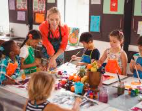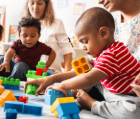Starting kindergarten is a big step in a young child’s life, and it marks the beginning of formal education. While every child learns at their own pace, there are simple and fun ways parents can help lay a strong academic foundation before school begins. Preparing your child academically for kindergarten doesn’t mean structured lessons every day—it’s about creating joyful, engaging learning moments that spark curiosity and build confidence.
1. Encourage a Love for Reading
One of the best ways to prepare your child is to read together daily. Picture books, rhyming stories, and alphabet books help children develop language skills, expand their vocabulary, and recognize sounds and letters. Ask open-ended questions about the story and encourage your child to describe what they see in the pictures. Reading aloud not only builds literacy skills but also strengthens your bond.
2. Practice Early Writing Skills
Before children can write words and sentences, they need to build fine motor strength. Offer crayons, pencils, or markers and let your child draw freely. Tracing shapes, writing their name, or copying simple letters can help improve hand control. You can turn everyday activities—like making a grocery list or writing a birthday card—into playful writing opportunities.
3. Build Number Awareness Through Play
Understanding basic numbers is key for kindergarten readiness. Count objects during playtime, identify numbers on signs or clocks, and sing counting songs. Simple board games or sorting activities can help your child recognize patterns and learn early math concepts like more, less, bigger, and smaller.
4. Boost Listening and Following Directions
In kindergarten, children are expected to listen carefully and follow instructions. Practice these skills through everyday routines. Give your child two- or three-step directions during play or chores (e.g., “Please pick up the toys and put them in the box”). Storytime also helps children learn to listen and recall details.
5. Expand Vocabulary Through Conversation
Talking with your child about daily life, feelings, and new experiences helps grow their vocabulary and communication skills. Whether you’re cooking, going for a walk, or running errands, use these moments to introduce new words and ask questions that encourage thoughtful responses.
6. Explore Shapes, Colors, and Sorting
Kindergarteners often work with basic shapes and colors. Play games that involve sorting objects by color, shape, or size. Use building blocks, puzzles, or even socks and buttons from around the house. These simple activities support early cognitive development and problem-solving skills.
7. Promote Independence and Confidence
Academic success in kindergarten is supported by social and self-care skills. Encourage your child to manage small tasks independently, like putting on their shoes or packing a bag. Celebrate efforts and progress rather than perfection—confidence grows from trying and learning.
8. Create a Calm Learning Space at Home
Even a small corner with books, crayons, and paper can become a special learning zone. When your child knows there’s a space where they can explore and create, they’re more likely to engage in learning activities.
Final Thought
Kindergarten readiness is about more than just ABCs and 123s. It’s about nurturing curiosity, building routines, and helping your child feel excited and capable as they begin their school journey. With gentle guidance and playful learning, your child will be well-prepared to thrive in their first year of school.


